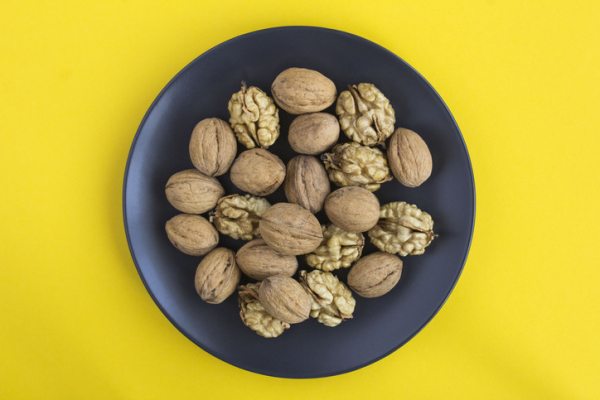
What can you add to a wide variety of foods, from cereals to salads, that’s crunchy, filling, and flavorful — and good for your heart? The answer is nuts. While all varieties of nuts are chock full of important nutrients, walnuts may be especially good for protecting cardiovascular health, according to a recent study in the journal Circulation that supports earlier research in this realm.
What is the study?
The Walnuts and Healthy Aging study is a randomized controlled trial supported by a grant from the California Walnut Commission that tracked healthy older adults living in two communities. For the study, researchers recruited 708 adults ages 63 to 79 living in Loma Linda, California, or Barcelona, Spain, and split them into two groups. One group added about a quarter-cup to a half-cup of walnuts to their daily diet for two years, while the other group ate no walnuts.
After two years, average levels of harmful low-density lipoprotein (LDL) cholesterol were modestly lower in the walnut group. Of note: nearly a third of the participants were taking cholesterol-lowering statins, so the average cholesterol levels of both groups were already in a normal range. The researchers speculate that the cholesterol-lowering benefits from walnuts might be more pronounced in people with elevated cholesterol levels. There is no way to know from the current data if this is true.
“This recent trial confirms what earlier studies have found, namely, that that adding walnuts to your diet appears to improve your cholesterol levels,” says Dr. Deirdre Tobias, an obesity and nutritional epidemiologist at Harvard-affiliated Brigham and Women’s Hospital. The new trial also lasted much longer than past walnut studies. However, it’s not clear what foods were being replaced by the walnuts in the participants’ diets, which might affect the magnitude of benefits the researchers saw. For example, replacing unhealthful, ultra-processed snacks with walnuts would presumably have a greater benefit than a lateral move from healthy options to walnuts, Dr. Tobias explains.
Lower levels of harmful blood fats, no additional weight
The researchers also analyzed the concentration and size of the LDL particles. Smaller, more dense LDL particles are more likely to trigger atherosclerosis, the buildup of fatty plaque inside arteries that’s the hallmark of most cardiovascular disease that results in heart attacks or strokes.
The walnut eaters had lower levels of these smaller particles. They also had decreased levels of intermediate-density lipoproteins (IDL), which are also linked to a rise in cardiovascular-related risks. And even though a quarter-cup of chopped walnuts is about 190 calories (and a half-cup is about 380 calories), the walnut eaters did not pack on any extra pounds.
Earlier research has found that people who eat nuts regularly are less likely to have heart disease, and many studies have focused specifically on walnuts. In 2018, Dr. Tobias and colleagues published a meta-analysis and systematic review of studies that examined how eating walnuts affects a person’s blood lipids and other heart-related risks. The review included 26 controlled trials involving a total of more than 1,000 people. It found that walnut-enriched diets led to lower total cholesterol, LDL cholesterol, and triglycerides, the most common form of fat in the bloodstream.
What’s special about walnuts?
Although all nuts are good sources of healthy unsaturated fats, walnuts are especially rich in alpha-linolenic acid (ALA). This is a precursor to the omega-3 fatty acids EPA and DHA found in fatty fish that are known for their heart-protecting powers. Our bodies convert ALA to EPA and DHA, although the efficiency of this varies from person to person.
What’s more, walnuts are usually eaten raw. So they have greater antioxidant abilities than nuts that are usually eaten roasted. (Antioxidants help prevent or reduce the artery-damaging oxidation that contributes to heart disease).
Adding walnuts to your diet
It’s worth noting that the FDA allows a qualified health claim on some nuts (including walnuts). Foods made with them are permitted to include the following statement: “Eating a diet that includes one ounce of nuts daily can reduce your risk of heart disease.” An ounce of walnuts is about a handful, or one-quarter cup.
You can sprinkle walnuts onto oatmeal or other hot or cold cereals; stir them into pancakes, muffins, or other quick breads; or toss them with vegetables or into salads. If high cholesterol is a health concern for you, there are other foods that may help lower your LDL cholesterol and boost your heart health.


